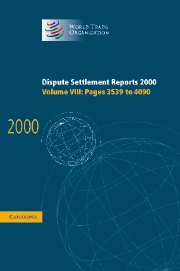Book contents
- Frontmatter
- Contents
- Korea - Measures Affecting Government Procurement (WT/DS163): Report of the Panel
- United States - Section 110(5) of the US Copyright Act (WT/DS160): Report of the Panel
- Brazil - Export Financing Programme for Aircraft Recourse by Canada to Article 21.5 of the DSU (WT/DS46): Report of the Appellate Body
Brazil - Export Financing Programme for Aircraft Recourse by Canada to Article 21.5 of the DSU (WT/DS46): Report of the Appellate Body
Published online by Cambridge University Press: 13 December 2017
- Frontmatter
- Contents
- Korea - Measures Affecting Government Procurement (WT/DS163): Report of the Panel
- United States - Section 110(5) of the US Copyright Act (WT/DS160): Report of the Panel
- Brazil - Export Financing Programme for Aircraft Recourse by Canada to Article 21.5 of the DSU (WT/DS46): Report of the Appellate Body
Summary
INTRODUCTION
Brazil appeals from certain issues of law and legal interpretation in the Panel Report, Brazil - Export Financing Programme for Aircraft, Recourse by Canada to Article 21.5 of the DSU (the “Article 21.5 Panel Report”). The Article 21.5 Panel was established pursuant to Article 21.5 of the Understanding on Rules and Procedures Governing the Settlement of Disputes (the “DSU”) to consider a complaint by Canada with respect to the existence or consistency with the Agreement on Subsidies and Countervailing Measures (the “SCM Agreement”) of measures taken by Brazil to comply with the recommendations and rulings of the Dispute Settlement Body (the “DSB”) in Brazil - Export Financing Programme for Aircraft (“Brazil - Aircraft”).
The original panel found as follows: “… we find that payments on exports of regional aircraft under the PROEX interest rate equalization scheme are export subsidies inconsistent with Article 3 of the SCM Agreement.” The original panel then recommended “that Brazil withdraw the subsidies identified above without delay”, which in this dispute was found to be within 90 days. On appeal, the Appellate Body upheld this recommendation.
Brazil took steps to implement the recommendations and rulings of the DSB. Taking the view that the measures adopted by Brazil to comply with the recommendations and rulings of the DSB were not consistent with Article 3.1(a) of the SCM Agreement, Canada requested that the matter be referred to the original panel, pursuant to Article 21.5 of the DSU. On 9 December 1999, the DSB referred the matter to the original panel.
The Article 21.5 Panel considered claims by Canada that Brazil had failed to comply with the recommendations and rulings of the DSB. Canada argued that Brazil continued to issue NTN-I bonds pursuant to letters of commitment issued before 18 November 1999 under the terms and conditions of PROEX before its modification; and that the modifications to PROEX adopted by Brazil did not constitute the withdrawal of the subsidies, as PROEX was still inconsistent with the prohibition on export subsidies under Article 3.1(a) of the SCM Agreement.
- Type
- Chapter
- Information
- Dispute Settlement Reports 2000 , pp. 4067 - 4090Publisher: Cambridge University PressPrint publication year: 2003
- 2
- Cited by

